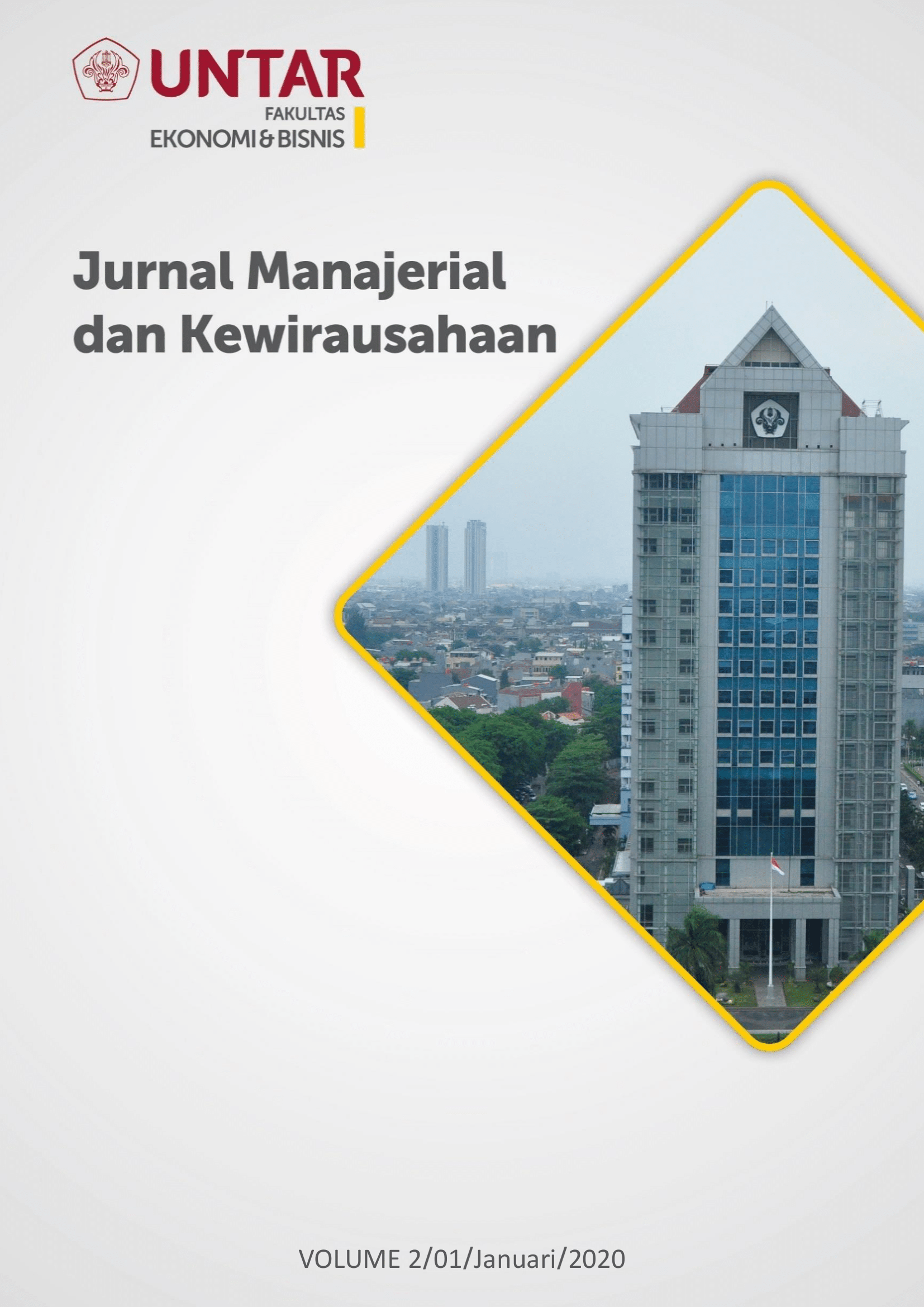Pengaruh Pendidikan Kewirausahaan, Efikasi Diri Dan Locus Of Control Terhadap Intensi Berwirausaha
Main Article Content
Abstract
The purpose of this research is to determine the effect of entrepreneurship education, self-efficacy and locus of control on entrepreneurial intentions of Tarumanagara University Faculty of Economics students. This study uses a non-probability sampling method with the number of samples taken in the study were 150 respondents of the Faculty of Economics students at Tarumanagara University. This questionnaire was distributed to respondents from the Economics department who had taken entrepreneurship courses. Data analysis method uses SEM (Structural Equation Modeling) with the SmartPLS program. The results of this study indicate that there is an influence of entrepreneurship education, self efficacy and locus of control on entrepreneurial intentions of Tarumanagara University Faculty of Economics students.
Tujuan penelitian ini adalah untuk mengetahui pengaruh pendidikan kewirausahaan, efikasi diri dan locus of control terhadap intensi berwirausaha mahasiswa Fakultas Ekonomi Universitas Tarumanagara. Penelitian ini menggunakan metode pengambilan sampel non-probability sampling dengan jumlah sampel yang diambil dalam penelitian ialah 150 responden mahasiswa Fakultas Ekonomi Universitas Tarumanagara. Kuesioner ini dibagikan kepada responden jurusan Ekonomi yang sudah mengambil mata kuliah kewirausahaan. Metode analisis data menggunakan SEM (Structural Equation Modelling) dengan program SmartPLS. Hasil penelitian ini menunjukan bahwa terdapat pengaruh pendidikan kewirausahaan, efikasi diri dan locus of control terhadap intensi berwirausaha mahasiswa Fakultas Ekonomi Universitas Tarumanagara.
Article Details
This work is licensed under a Jurnal Muara Ilmu Ekonomi dan Bisnis Creative Commons Attribution-ShareAlike 4.0 International License.,/p>
References
Alberti F, Sciascia dan Poli. 2004. Entrepreneurship Education: Notes on an Ongoing Debate. Disampaikan pada Proceedings of the 14th Annual International Entrepreneurship Conference, University of Nopoli, Federico II, Italy, 4-7 Juli 2004 .
Alwisol. (2008). Psikologi Kepribadian (U. Press, ed.). Malang.
Andika, M., & Madjid, I. (2012). analisis pengaruh sikap, norma subyektif dan efikasi diri terhadap intensi berwirausaha pada mahasiswa fakultas ekonomi universitas syiah kuala (Studi Pada Mahasiswa Fakutas Ekonomi Universitas Syiah Kuala). EcoEntrepreneurship Seminar & Call for Paper “Improving Performance by Improving Environment,” 190–197.
Ayodele, K. O. (2013). Demographics, Entrepreneurial Self-Efficacy and Locus of Control as Determinants of Adolescents’ Entrepreneurial Intention in Ogun State, Nigeria. European Journal of Business and Social Sciencesournal of Business and Social Sciences, 1(12), 59–67.
Bae, T. J., Qian, S., Miao, C., & Fiet, J. O. (2014). The Relationship Between Entrepreneurship Education and Entrepreneurial Intentions: A Meta-Analytic Review. Entrepreneurship: Theory and Practice, 38(2), 217–254.
Bansal, H. S., Taylor, S. F., & James, Y. S. (2005). “Migrating” to new service providers: Toward a unifying framework of consumers’ switching behaviors. Journal of the Academy of Marketing Science, 33(1), 96–115.
Budi, R., Dan, L., Wijaya, T., & Mdp, S. (2012). Faktor demografis (gender, latar belakang pendidikan orang tua, dan pengalaman bekerja) dapat mempengaruhi pilihan karir menjadi wirausahawan. Faktor Demografis (Gender, Latar Belakang Pendidikan Orang Tua, Dan Pengalaman Bekerja) Dapat Mempengaruhi Pilihan Karir Menjadi wirausahawan., 1(2), 112–119.
Bustan, J. (2014). Pengaruh Prestasi, Locus of Control, Resiko, Toleransi Ambiguitas, Percaya Diri, Dan Inovasi Terhadap. Jurnal Orasi Bisnis, 11, 60–67.
Chimucheka, Tendai. 2013. The Impact of Entrepreneurship Education on the Establishment and Survival of Small, Micro and Medium Enterprises (SMMEs). Journal Economics, 4(2): 157-168.
Dinis, A., Paço, A. do, Ferreira, J., Raposo, M., & Rodrigues, R. G. (2013). Psychological characteristics and entrepreneurial intentions among secondary students. Education and Training, 55(8–9), 763–780.
do Paço, A., Ferreira, J. M., Raposo, M., Rodrigues, R. G., & Dinis, A. (2013). Entrepreneurial intentions: is education enough? International Entrepreneurship and Management Journal, 11(1), 57–75.
Drnovšek, M., Wincent, J., & Cardon, M. S. (2010). Entrepreneurial self-efficacy and business start-up: Developing a multi-dimensional definition. International Journal of Entrepreneurial Behaviour and Research, 16(4), 329–348.
Fatoki, O. (2014). The Entrepreneurial Intention of Undergraduate Students in South Africa: The Influences of Entrepreneurship Education and Previous Work Experience. Mediterranean Journal of Social Sciences, 5(7), 294–299.
Gerba, Dugassa Tessema. 2012. Impact of entrepreneurship education on entrepreneurial intentions of business and engineering students in Ethiopia. Journal of Economic and Management Studies, 3(2): 258-277.
Hair, J. F., Ringle, C. M., & Sarstedt, M. (2011). PLS-SEM: Indeed a Silver Bullet. Journal of Marketing Theory and Practice, 19(2), 139–152.
Henseler, J., Ringle, C. M., & Sinkovics, R. R. (2009). The use of partial least square path modeling in International Marketing. Advances in International Marketing, 20, 277-319.
Hisrich, R. D, Peters, M. P ., & Shepherd, D. A. (2008). Enterpreneurship: Mc Graw hill International edition.
Indarti, N., & Rostiani, R. (2008). Undergraduate student’s entrepreneurial intention: A comparative study among Indonesia, Japan and Norway. Journal of Indonesian Economy and Business, 23(4), 369–384.
Lorz, M. (2013). The Impact of Entrepreneurship Education on Entrepreneurial Attitudes and Intention. Journal of Small Business Management, 53(1), 75–93.
Martin, B. C., McNally, J. J., & Kay, M. J. (2013). Examining the formation of human capital in entrepreneurship: A meta-analysis of entrepreneurship education outcomes. Journal of Business Venturing, 28(2), 211–224.
Mueller, S. (2011). Increasing entrepreneurial intention: effective entrepreneurship course characteristics. International Journal of Entrepreneurship and Small Business, 13(1), 55.
Nursito, S., & Nugroho, A. J. S. (2013). Analisis Pengaruh Interaksi Pengetahuan Kewirausahaan dan Efikasi Diri Terhadap Intensi Wirausaha. Kiat Bisnis, 5(3), 148–158.
Oosterbeek, H., van Praag, M., & Ijsselstein, A. (2010). The impact of entrepreneurship education on entrepreneurship skills and motivation. European Economic Review, 54(3), 442–454.
Pedrini, M., Langella, V., & Molteni, M. (2017). Do entrepreneurial education programs impact the antecedents of entrepreneurial intention? An analysis of an entrepreneurship MBA in Ghana. Journal of Enterprising Communities.
Sekaran, U., & Bogie, R. (2013). Research Methods for Business. United Kingdom: John Wiley & Sons Ltd.
Wiriani, W., Piatrini, P. S., Ardana, K., & Juliarsa, G. (2013). Efek Moderasi Locus of Control pada Hubungan Pelatihan dan Kinerja pada Bank Perkrediatan Rakyat. Jurnal Ilmiah Akuntansi Dan Bisnis, 8(2), 99–105.
Zhang, Y., Duysters, G., & Cloodt, M. (2014). The role of entrepreneurship education as a predictor of university students’ entrepreneurial intention. International Entrepreneurship and Management Journal, 10(3), 623–641.
Zulkosky, K. (2009). Self-Efficacy: A Concept Analysis.



